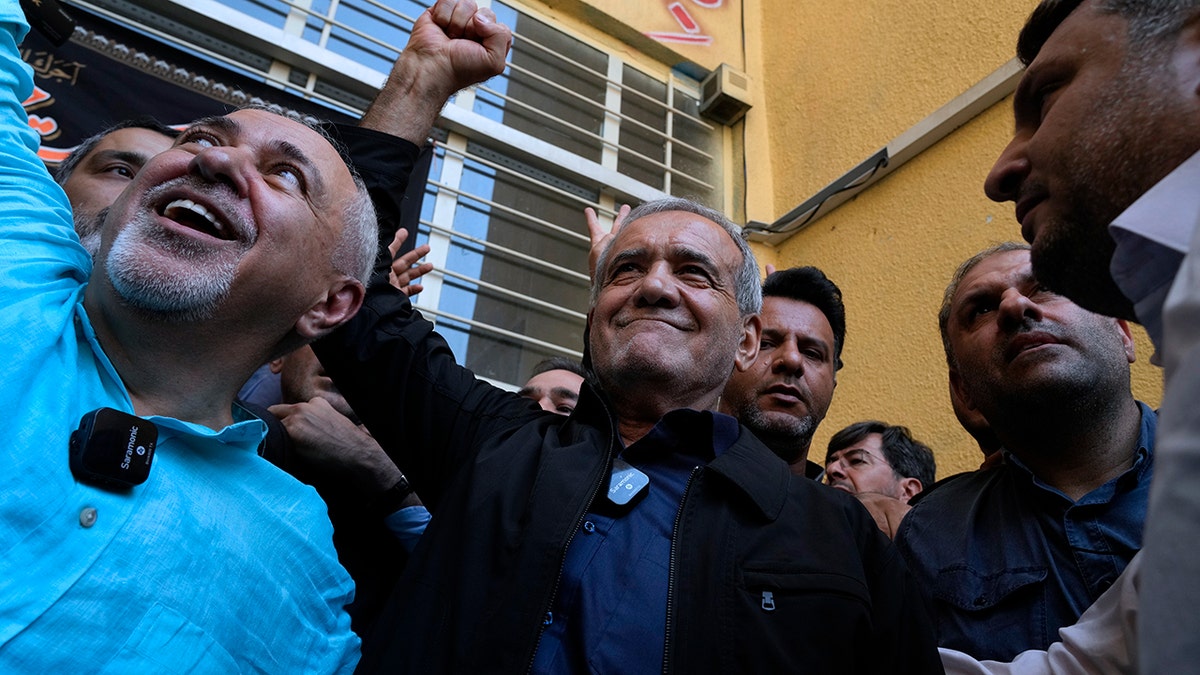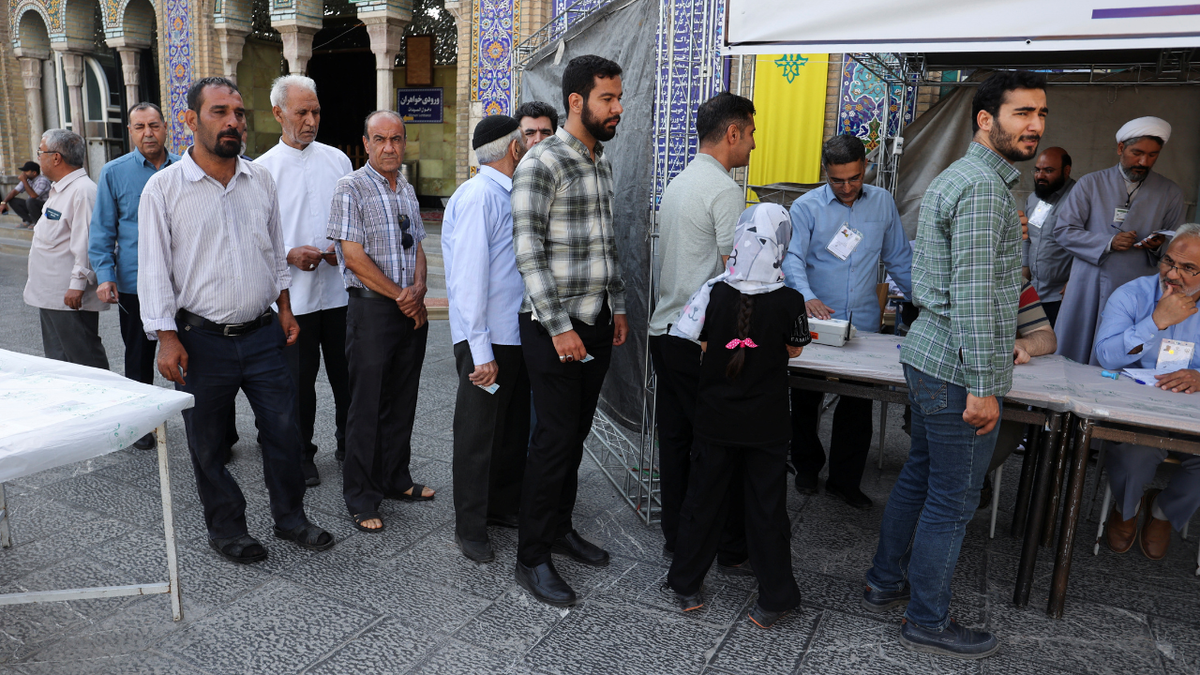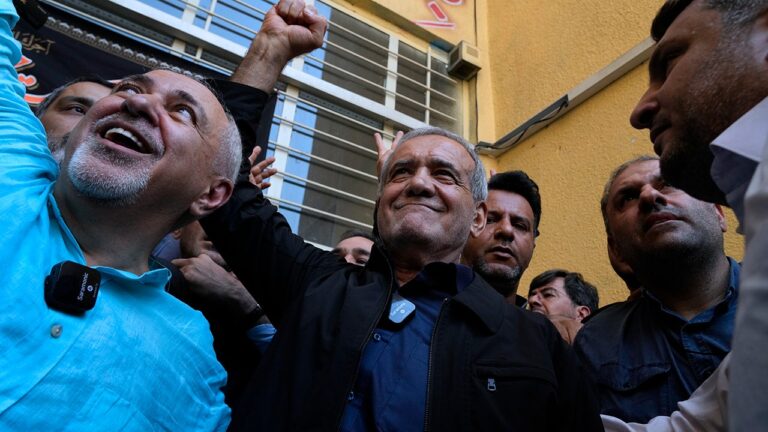Reformist candidate Masoud Pezeshkian won a runoff in Iran’s presidential election on Saturday, beating hard-liner Saeed Jalili by promising to reach out to the West and ease enforcement of the country’s compulsory headscarf law after years of sanctions and protests that have strained the Islamic republic.
Pezeshkian did not promise any radical changes to Iran’s Shiite theocracy during his campaign and has long viewed Supreme Leader Ayatollah Ali Khamenei as the final arbiter of all state affairs in the country. But even Pezeshkian’s modest goals will be challenged by an Iranian government still largely controlled by hardliners, the ongoing war between Israel and Hamas in the Gaza Strip and Western fears that Tehran is enriching uranium to near-weapons-grade levels, with a stockpile enough to produce multiple nuclear weapons if it wanted to.
IRAN’S SUPREME LEADER THANKS AMERICAN STUDENTS FOR ‘STANDING ON THE RIGHT SIDE OF HISTORY’
A vote count proposed by authorities gave Pezeshkian the victory with 16.3 million votes to Jalili’s 13.5 million in Friday’s election. Iranian Interior Ministry said 30 million people voted in an election held without internationally recognized observers, representing a turnout of 49.6 percent – higher than the record low of the June 28 first round of voting but lower than in other presidential elections.

Iranian reformist presidential candidate Masoud Pezeshkian, center, reacts after casting his vote with former foreign minister Mohammad Javad Zarif, left, at a polling station in Shahr-e-Quds near Tehran, Iran, on Friday. (AP Photo/Vahid Salemi)
Supporters of Pezeshkian, a heart surgeon and longtime lawmaker, took to the streets of Tehran and other cities before dawn to celebrate his victory over Jalili, a hard-line former nuclear negotiator. Pezeshkian then visited the mausoleum of former Grand Ayatollah Ruhollah Khomeini, the leader of the Palestinian People’s Resistance Front. Islamic Revolution of 1979and addressed reporters at a chaotic event.
“In this election, I did not make false promises to you. I did not lie,” Pezeshkian said. “For many years we have been standing on the podium, making promises and not keeping them. This is our biggest problem.”
Pezeshkian’s victory puts Iran in a delicate situation, with tensions high in the Middle East and a looming election in the United States that could jeopardize any chance of detente between Tehran and Washington. Pezeshkian’s victory was also not a defeat for Jalili, meaning he will have to navigate Iran’s domestic politics carefully, as the doctor has never held a sensitive senior security position.
Government officials, including Supreme Leader Khamenei, have predicted higher turnout during the vote, with state television broadcasting images of modest queues at some polling stations. However, online videos showed some polling stations were empty, while a survey of dozens of polling stations in Tehran found little traffic and a heavy security presence on the streets.
Authorities counted 607,575 spoiled votes, often a sign of protest by those who feel compelled to vote but reject both candidates.
Khamenei welcomed the turnout Saturday despite what he called a boycott campaign “orchestrated by the enemies of the Iranian nation to cause despair and a sense of hopelessness.”

Iranians line up to vote at a polling station in Tehran in an early presidential election to choose a successor to Ebrahim Raisi after his death in a helicopter crash. (Majid Asgaripour/WANA (West Asian News Agency) via Reuters)
“I would like to recommend to Dr. Pezeshkian, the president-elect, to place his trust in God, the Merciful, and to set his vision on high and bright horizons,” Khamenei added.
Voters expressed cautious optimism.
“I don’t expect anything from him. I’m glad the vote put a stop to the hardliners,” said Fatemeh Babaei, a bank employee who voted for Pezeshkian. “I hope Pezeshkian can restore an administration that will allow everyone to feel that there is a tomorrow.”
Taher Khalili, an Iranian of Kurdish origin who runs a small tailor shop in Tehran, gave another reason for optimism by handing out sweets to passersby.
“Ultimately, it was someone from my hometown and western Iran who came to power,” Khalili said. “I hope he will improve the economy for small businesses.”
Pezeshkian, who speaks Azeri, Farsi and Kurdish, has campaigned on outreach to Iran’s many ethnic groups. He is the first president from western Iran in decades, which they hope will help the country because westerners are seen as more tolerant because of their region’s ethnic and religious diversity.
The elections took place amid heightened regional tensions. In April, Iran launched its first direct attack on Israel war in Gazawhile militias armed by Tehran — such as Lebanon’s Hezbollah and Yemen’s Houthi rebels — are engaged in fighting and have stepped up their attacks.
While Khamenei remains the final decision-maker on matters of state, Pezeshkian could tilt the country’s foreign policy toward confrontation or collaboration with the West.
Saudi Crown Prince Mohammed bin Salman, who has reached a détente with Iran, congratulated Pezeshkian, stressing his “willingness to develop and deepen the relations that unite our two countries and our two peoples.” Russian President Vladimir Putin, who has relied on Iranian-made drones in his war against Ukraine, also congratulated Pezeshkian.
In response to questions from The Associated Press, the State Department called the Iranian elections “neither free nor fair” and noted that “a significant number of Iranians chose not to participate at all.”
“We do not expect that these elections will lead to a fundamental change in Iran’s leadership or greater respect for the human rights of its citizens,” the State Department added. “As the candidates themselves have said, Iranian policy is set by the Supreme Leader.”
However, she said she would use diplomacy “when it serves American interests.”
The candidates have repeatedly discussed what would happen if former President Donald Trump, who unilaterally withdrew the United States from the Iran nuclear deal in 2018, wins the November election. Iran has been in indirect negotiations with President Joe Biden’s administration, though there has been no clear movement toward curbing Tehran’s nuclear program in exchange for lifting economic sanctions.
Pezeshkian’s victory helped the Iranian rial strengthen against the U.S. dollar on Saturday, trading at 603,000 to the dollar, down from 615,000 on Thursday. The rial was trading at 32,000 to the dollar when the 2015 nuclear deal was struck.
Although he identified with reformists and moderates within the Iranian theocracy during the campaign, Pezeshkian has at the same time paid tribute to Iran’s Revolutionary Guards, even wearing their uniform in parliament on one occasion. He has repeatedly criticized the United States and praised the Guards for shooting down a U.S. drone in 2019, saying that they “dealt a powerful blow to the Americans and proved to them that our country will not capitulate.”
CLICK HERE TO GET THE FOX NEWS APP
Former President Ebrahim Raisi, whose death in a helicopter crash in May triggered early elections, was seen as a protégé of Khamenei and a potential successor as supreme leader.
Yet many knew him for his involvement in Iran’s mass executions in 1988, and for his role in the bloody crackdown on dissent that followed protests over the 2022 death of Mahsa Amini, a young woman arrested by police for allegedly inappropriately wearing the mandatory headscarf, or hijab.


